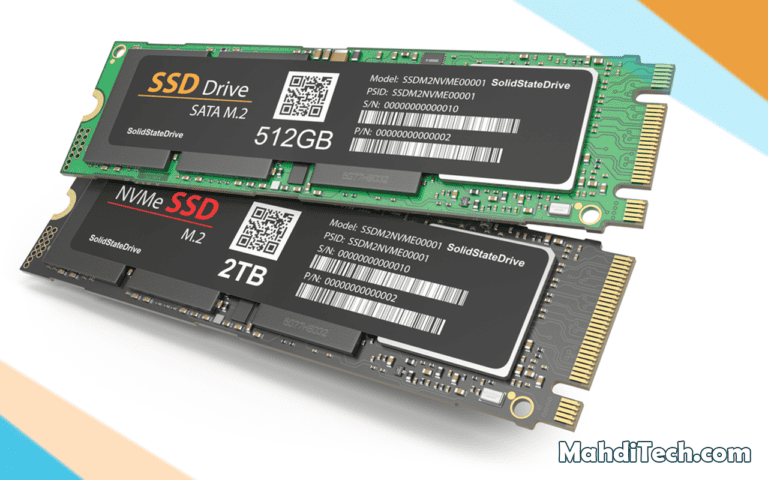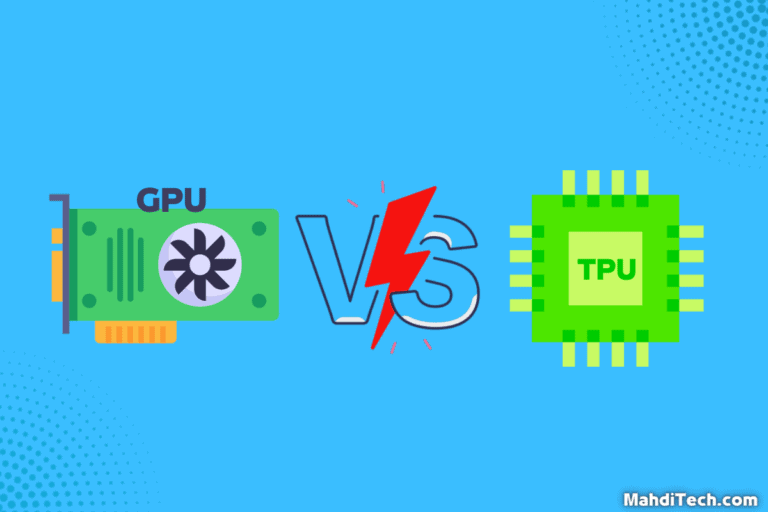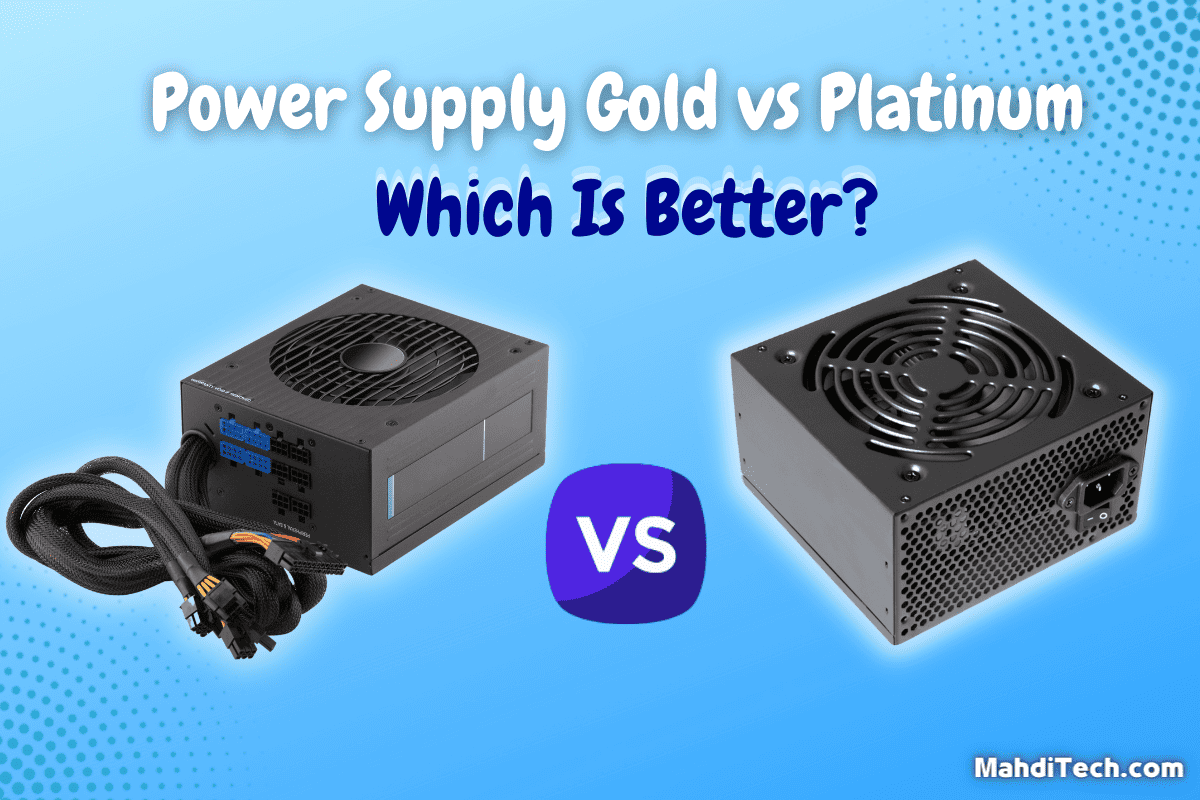
Navigating the world of PC power supplies can be intricate, especially when you’re faced with choices like ‘power supply gold vs platinum.’ This guide unravels the complexities of the 80 PLUS Rating, showcasing how energy efficiency standards categorize PSUs and their real-world implications for users.
Understanding these certifications is crucial, whether you’re delving into the intricacies of efficiency, heat dissipation, internal components, or the long-term costs associated with different PSU ratings.
By the end of this comprehensive comparison between power supply gold vs platinum, you’ll be equipped to discern which PSU aligns best with your needs and budget.
Let’s embark on this enlightening journey.
Understanding 80 PLUS Ratings
Diving into the realm of PSUs, the 80 PLUS Ratings stand as a beacon for energy efficiency.
Let’s unravel its significance.
What is an 80 PLUS Rating?
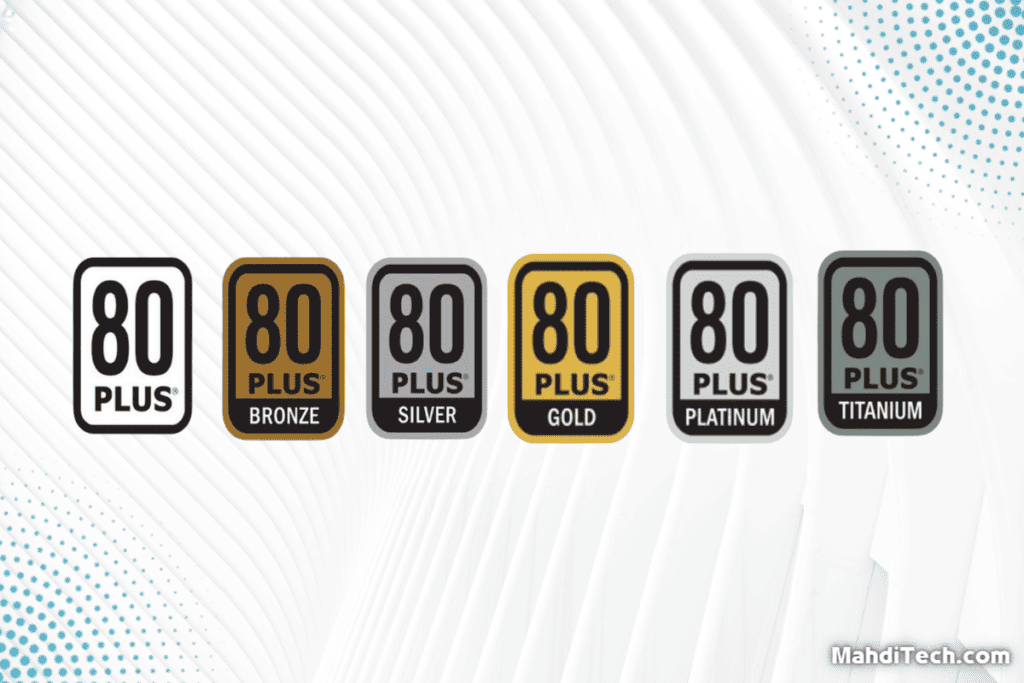
The 80 PLUS Rating system provides a benchmark for understanding the energy efficiency of power supply units. Starting from the basic level, the spectrum stretches from bronze, silver, and gold to Platinum and peaks at Titanium. Each subsequent group, such as transitioning from a gold-rated PSU to a platinum-rated PSU, represents an enhancement in energy optimization. These certifications specify how much energy a unit draws and, more critically, how efficiently this energy is converted to actual power for your PC.
With today’s rising energy costs and environmental concerns, investing in a higher-tiered PSU, like a titanium-rated one, could result in long-term savings and reduced waste. Remember, more power doesn’t necessarily mean better; it’s about how efficiently your PSU operates. Making informed decisions about these ratings can impact your tech performance and energy bills.
Rating System Mechanics
The 80 Plus system provides clear benchmarks for power supply Productivity ratings. At its core, this system evaluates how adeptly a PSU converts raw energy from an outlet into usable power for your computer components. Every Psu rating, from Bronze to Titanium, represents a specific efficiency tier.
For instance, a gold PSU guarantees a certain efficiency percentage, typically higher than its bronze or silver counterparts. Rather than focusing solely on total power draw, these ratings spotlight the effective and wasteful use of drawn power.
The higher the rating, the less energy is wasted in the conversion process, making your PC operation more environmentally friendly and cost-efficient. Through understanding these mechanics, users can make informed decisions about the balance between initial investment and long-term energy savings.
With its varying tiers, the 80 Plus rating system provides insights into the power supply efficiency ratings and Performance of power supplies under different load conditions. Consider the following:
| Certification | 20% Load Efficiency | 50% Load Efficiency | 100% Load Efficiency |
|---|---|---|---|
| 80 PLUS | — | ≥80% | — |
| 80 PLUS Bronze | ≥82% | ≥85% | ≥82% |
| 80 PLUS Silver | ≥85% | ≥88% | ≥85% |
| 80 PLUS Gold | ≥87% | ≥90% | ≥87% |
| 80 PLUS Platinum | ≥90% | ≥92% | ≥89% |
| 80 PLUS Titanium | ≥90% (at 10% load) | ≥94% | ≥90% |
At a glance, the table outlines the efficiency of power supplies at various load levels. As a PSU operates under 20%, 50%, or 100% of its maximum load, its efficiency can fluctuate. Higher-rated certifications, like Platinum and Titanium, consistently deliver better energy conservation, even under extreme workloads. These benchmarks signify potential savings on energy bills and hint at reduced environmental impact. In short, as you ascend the tiers from basic to 80 PLUS platinum to Titanium, the power supply’s ability to use energy more judiciously, reducing waste, becomes more pronounced.
Power Supply Gold vs Platinum: The Basics
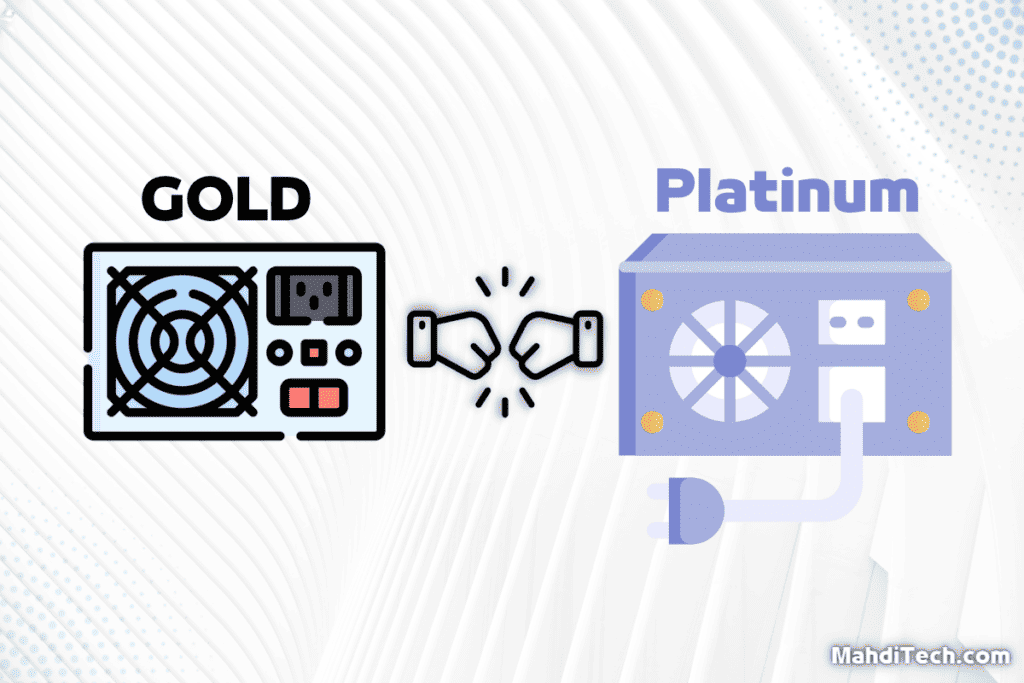
Distinguishing between gold and platinum PSUs is crucial for optimizing any PC setup. While they may appear similar, each tier offers unique benefits. Delve into our detailed breakdown to ensure you make the informed choice for your computing needs.
Efficiency Levels
Both the gold and Platinum PSU are renowned for their exceptional efficiency ratings. While a gold power supply confidently operates between 87-90% Productivity during 50% to 100% workloads, the platinum PSU is a step ahead, promising 90-92% under the same conditions. Understanding these efficiency levels can be a game-changer for users keen on maximizing their PC’s Performance without a significant draw on power.
Heat Dissipation
A significant advantage of higher efficiency is reduced wasted energy, which often emerges as unwanted heat. With its superior Productivity, the platinum PSU naturally dissipates less heat than a gold PSU during similar operations.
Reduced heat not only ensures the longevity of the power supply itself but also safeguards other sensitive components, like the Wi-Fi card, from potential heat-related issues.
Component Quality
A platinum power supply typically comes equipped with more advanced or higher-grade internal components than its gold counterpart.
This intrinsic quality guarantees the PC hardware’s stated efficiency and boosts the unit’s overall reliability and durability. When considering the PC’s worth in terms of longevity and Performance, the quality of PSU components plays a crucial role.
Energy Savings

Though the efficiency difference might appear marginal, it’s crucial to understand its implications for long-term energy consumption. Especially for those who use power-hungry setups like Cheap Prebuilt Gaming PCs, choosing Platinum over gold can lead to noticeable energy savings over extended periods. It’s an investment that pays dividends in reduced energy bills.
Cost Implication
Initial investments for platinum PSUs tend to be higher than gold ones. However, when viewed through the lens of potential energy savings, reduced component wear, and the potential for a longer lifespan, the platinum PSU can be a cost-effective choice in the long run.
Future-proofing
With the trajectory of global energy prices and growing environmental awareness, a higher Performance, PSU like Platinum, offers a buffer against future energy cost hikes. Coupled with sustainability, it aligns with modern-day priorities, ensuring your tech is environmentally and economically attuned.
Which PSU is Right for You?
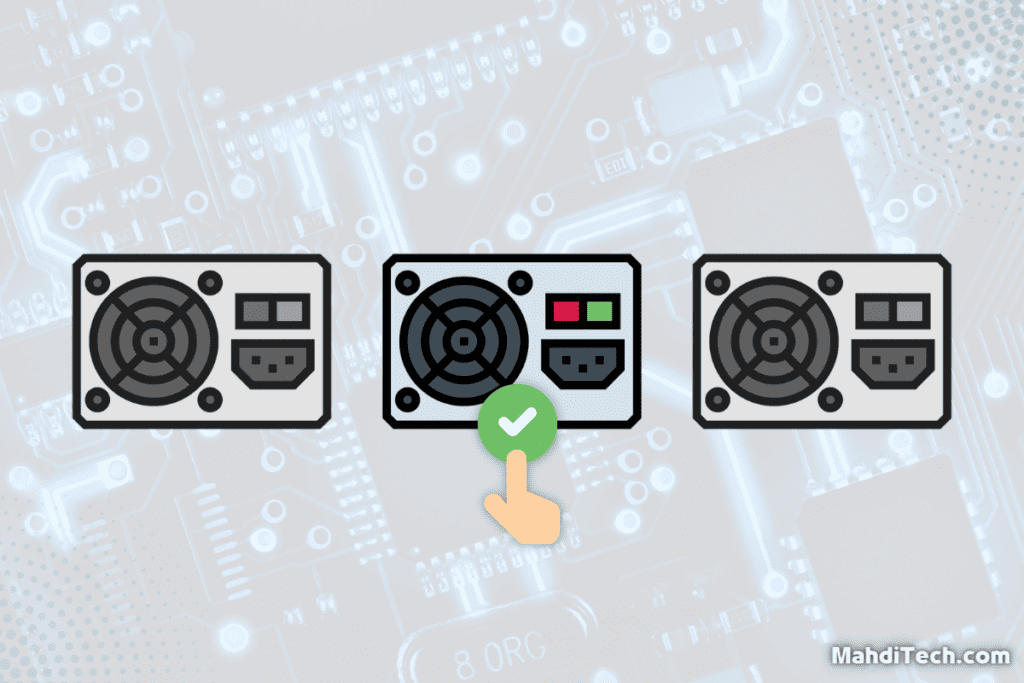
Several factors come into play when determining the most suitable power supply for your needs. Let’s narrow it down to the gold and platinum certifications.
On a tight budget? The 80-plus gold offers a commendable balance of Productivity without breaking the bank. For systems demanding less power, the gold Psu often matches those requirements adequately. However, the platinum power supply stands out if you want better quality with minimum efficiency losses, especially for high-performance rigs.
The price difference might seem significant initially, but Platinum’s long-term benefits, including future-proofing, justify the investment. Given the blend of price, Performance, and future adaptability, the platinum power supply is the right choice for most PC users.
Real-life Scenarios

Imagine you’re assembling a mid-range PC that won’t be pushed to its limits—perhaps for standard office tasks or basic multimedia activities. Here, a gold PSU, with its commendable efficiency rating, would suit your needs without overspending.
On the other hand, you’re crafting a high-performance gaming rig designed to run the latest AAA titles or perhaps to be paired with a powerful gaming laptop. The platinum Psu, renowned for its superior efficiency and robust build, makes more sense in such a situation.
Essentially, the choice between gold vs. platinum hinges on your PC’s anticipated workload.
For regular use, the gold power supply is often sufficient. However, investing more in a gold-rated power supply than a platinum PC power supply for those aiming for peak performance and longevity proves wise.
Conclusion

Navigating the intricate world of power supplies, from bronze, silver, and gold to platinum tiers, can be daunting. At the core, the efficiency and long-term power savings differentiate a platinum-rated PSU from its gold counterpart. While the debate of gold vs. Platinum continues, it’s crucial to align your choice with your PC hardware’s demands and anticipated workload.
Though both are top-rated power supplies, Platinum offers slight advantages in efficiency, making it a prime choice for power-intensive tasks.
Ultimately, while the gold tier is a robust option supplying power seamlessly, those willing to invest for optimal Performance should consider the platinum variant.
FAQs
What’s the primary difference between Gold and Platinum rated power supplies?
The critical difference lies in their Performance levels. While Gold and Platinum are among the higher tiers of 80 PLUS certifications, Platinum PSUs typically offer slightly better efficiency, especially under variable load conditions.
How does the efficiency of a power supply impact my electricity bill?
The efficiency rating of a PSU indicates how much of the drawn power is used by the system and how much is wasted as heat. A more efficient PSU (like Platinum) converts more drawn power into usable energy, reducing wasted electricity and potentially lowering electricity bills.
Are higher-rated power supplies (like Platinum) always better for all PC builds?
Not necessarily. While platinum-rated power supplies offer better Performance, they often come at a higher cost. A Gold rating PSU can be more cost-effective for a standard office PC or essential multimedia use. However, investing in a Platinum PSU can provide better long-term value and power savings for high-end gaming rigs or workstations.

